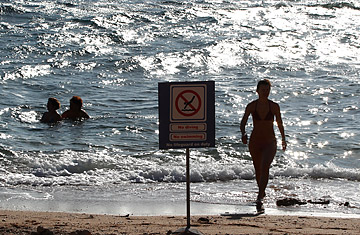
Tourists are seen at a beach at which swimming and diving is prohibited at the Red Sea resort of Sharm el-Sheikh.
It is now safe to go back in the water. Or at least that's what the governor of South Sinai, Mohamed Shosha, told reporters at the Egyptian beach resort of Sharm el-Sheikh on Sunday night, a week after a series of unprecedented shark attacks sent authorities and experts scrambling for answers, ordering swimmers out of the sea.
For over a week, authorities, tourists, and tour operators waited tensely in this shimmering coral-rimmed Red Sea town, while businesses stalled, and a team of U.S. scientists was rushed in to investigate the circumstances surrounding the attacks. On Sunday the scientists concluded their investigation, and South Sinai authorities announced that beaches would re-open in the next few days under a new set of safety rules.
The state will enforce international agreements against dumping in the Red Sea, they say. (One theory had been that dumped sheep carcasses had drawn sharks to the area.) Tourists will have to stay within a designated swimming area. Hotels will have to build lifeguard towers, if they don't already have them. Sea patrols will keep an eye on the water. And hotel staff and local authorities will receive training on how to perform rescues during a shark attack, says Salem Saleh, the director of the city's Tourism Authority. Most importantly, he adds: tourists will have to refrain from feeding the fish.
Experts have concluded that habitual fish feeding, and even sometimes shark feeding, may have been the biggest possible factor behind the recent attacks. The governor told reporters over the weekend that hotels would now strictly enforce a no fish feeding policy with signs and instructions. And Mohamed Salem, the director of national protected areas in the Sinai Peninsula, said that authorities would also produce an instructional video to be shown to tourists on incoming flights and in hotels.
But feeding the fish has been illegal for the past 20 years, says Salem, and signage is already plentiful. "I'd like to see tourists who come out here reminded that this is not a chlorinated pool they're jumping into. It's part of a natural environment," says George Burgess, one of the three American experts assigned to unraveling the shark mystery last week. Signs against fish feeding are important, he says, but promoting understanding is crucial. "There has got to be an ethic built so that people don't want to do it for the right reasons."
And that's where it might get tricky. Sharm el-Sheikh is Egypt's highest grossing coastal resort, with roughly four million annual visitors bringing in an estimated $5.3 billion according to the Chamber of Diving and Water Sports. Public opinion has a huge impact, both officials and industry staffers warn. And with Sharm's high-density package tour crowd, "shark" is a loaded word.
"We've got two publics," says Matthew Morrell, a British dive instructor at the Red Sea Diving College. "We've got the diving public" who, he says, know that sharks aren't a huge threat. "And in Sharm, we've got the package tour public. They're the kind of people who are coming here for a cheap vacation in the sun. When they hear 'shark attack' they immediately think that this is a dangerous place."
Tourist wariness is sure to color any official planning in the weeks ahead. Already in the days following the attacks, shopkeepers and tour operators in Sharm el-Sheikh complained that sales had slowed considerably. And a manager at one of the hotels where an attack took place confessed that the hotel had seen numerous cancellations since the incident.
Many of the visitors to the Hyatt Regency, where the fatal attack on a 70-year-old German woman occurred, also remarked that hotel staff had neglected to tell them directly about the attack, despite the fact that the beach had been closed. "My daughter texted me from England," said Christine Dawson, a British tourist who was sitting in a Hyatt lounge chair a few days after the attack. "We didn't know much about it until well after it happened."
Mohamed Salem says that the future warning video to incoming tourists might mention the risk of shark attacks as an implication of feeding the fish — or it might not. "We have to review the idea with experts because it might have a negative impact on tourism if we say it's just because of sharks," he says. "It's many things. Feeding the fish might harm the environment — it's a lot of things including sharks, not just sharks."
Sharm el-Sheikh has faced the conundrum of how to protect against rare threats to its tourism lifeblood before the latest shark attacks. Just five years ago, a series of terrorist bombings killed 88 people and shut business down for months. The government reacted by building a wall around the city; resorts were transformed into heavily guarded fortresses; and security has remained on high alert ever since. "A lot of people died in the bombings. For two or three months, the city cleared out," says Mohamed Tantawi, who at the time was working in the Ghazala Gardens hotel, the site of the worst bombing. "But there's no comparison between what happened then and what happened with these shark attacks. The sharks have only attacked a few people, and hopefully it won't happen again." And while many tourists remain hesitant to go back in the water this week, most also say they wouldn't turn down another visit to Egypt's jewel on the Red Sea. Indeed, for Sharm el-Sheikh a couple of sharks may still be considered small fry.
